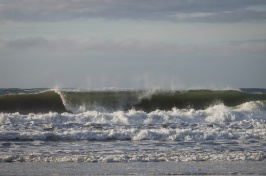Institute for the Study of Earth, Oceans, and Space (EOS)
Tracking Acidification in the Gulf of Maine
As ocean waters grow increasingly acidic, beloved shellfish like clams, oysters, scallops and lobsters — staples of coastal cuisine — face mounting challenges to survive, threatening both marine ecosystems and the seafood traditions we cherish. Now, a report co-edited by a UNH scientist identifies... Read More-
11/11/25
Mercury Stored in Coastal Sediments Is Making a Comeback
Buried deep in the sediments of the world’s coastal shelves, the toxic metal mercury has, to some degree, been locked away from entering the marine... -
09/24/25
Two UNH Space Weather Instruments Blast Off Toward the Sun
After years in the making, two UNH space weather instruments have blasted off toward the sun to study its influence on our solar system and monitor... -
09/04/25
From Online Discovery to Desert Research
UNH graduate student Anna Frisbie conducted fieldwork at Saguaro National Park, studying how natural soundscapes impact visitor experiences. Her...
Recent Stories
-
10/19/22 - For the Greater GoodA fellowship abroad helped Michael Coughlan hone his machine learning skills while improving the UK's home energy resilience. Read More
-
09/22/22 - Warming WatersA UNH postdoctoral researcher is studying impacts of climate change on methane-producing bacteria in Arctic lakes. Read More
-
09/20/22 - Shifting SandsData from the volunteer-based Beach Profiling Program indicates which N.H. beaches are most resilient to coastal storms. Read More
-
09/19/22 - Physics FellowUNH physics professor Nathan Schwadron has been elected to the prestigious 2022 Class of Fellows of the American Geophysical Union. Read More
-
09/15/22 - Carbon GatekeepersRuth Varner has received a $3.4 million grant from the Department of Energy to study the effects of climate change on methane emissions in Arctic lakes. Read More
-
09/07/22 - Meeting Great Bay HistoryA prestigious National Endowment for the Humanities grant will extend the work of the Great Bay Archaeological Survey to 72 K-12 teachers. Read More
-
09/07/22 - Baking and QuakingWith $1.7 million in National Science Foundation funding, UNH researchers will study how climate change in the Arctic could affect earthquake-related disasters. Read More
-
08/31/22 - Lunar LaunchA UNH-built instrument will aid NASA's mission to send astronauts safely back to the moon. Read More
-
08/24/22 - Another Leap ForwardUNH researchers have received a $750,000 NASA grant to study gamma ray bursts. Read More
-
08/23/22 - Hawks on the HuntA study by UNH researcher Laura Kloepper recently published in Nature Communications aids our understanding of how predators select and track a target among thousands of potential... Read More






























































